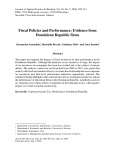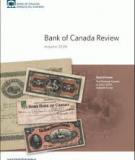
Fiscal incentives
-
The purpose of the paper was to investigate the role of fiscal incentives in driving foreign direct investment (FDI) inflows into the Ghanaian economy based on data from 1975 to 2017 with the Eclectic paradigm as the theoretical basis. FDI inflows was the dependent variable whiles trade openness, corporate tax rate, exchange rate and market size were the independent variables with corporate tax rate as the main explanatory variable of interest.
 10p
10p  trinhthamhodang9
trinhthamhodang9
 10-12-2020
10-12-2020
 19
19
 0
0
 Download
Download
-
This paper investigated the impact of fiscal incentives on firm performance in the Dominican Republic. Although the literature on tax incentives is large, the impact of tax incentives on companies has been less studied and is the subject of intense debate. The analysis, carried out on the period from 2006 to 2015, uses panel data models with fixed and random effects to evaluate the relationship between corporate tax incentives and firm-level performance indicators opportunely selected.
 15p
15p  nguyenanhtuan_qb
nguyenanhtuan_qb
 09-07-2020
09-07-2020
 19
19
 2
2
 Download
Download
-
In short, there is little reason to believe that a fiscal adjustment will lead to a substantial improvement in the United States’ trade position any time in the near future. This channel for offsetting the contractionary impact of deficit reduction is not very promising. The investment channel does not appear much more promising. With interest rates already at historic lows, it seems implausible that whatever further decline may occur as a result of adjustment could have very much impact.
 14p
14p  loginnhanh
loginnhanh
 22-04-2013
22-04-2013
 43
43
 4
4
 Download
Download
-
Over the longer run, the U.S. economy is likely to see an important rebalancing of our spending and production. Higher household saving rates imply that eventually other types of spending will need to fill the breach in aggregate demand. The most likely candidates are net exports and business fixed investment. For the past several years, low personal savings and substantial budget deficits have led to large inflows of foreign capital and large trade deficits. As we move to more sustainable levels of consumption and increased fiscal responsibility, capital inflows will...
 67p
67p  trinhcaidat
trinhcaidat
 19-04-2013
19-04-2013
 47
47
 5
5
 Download
Download
-
While at one time it might have been acceptable for companies to capture just the obviously “important” data and throw the rest away, today leading companies understand that the value of their data goes far deeper. The decision about which data to keep and which to throw away—that is, which data will prove to be important in the future—is deceptively hard to make. The result, according to industry analyst Richard Winter, is that businesses must store and analyze data at the most detailed level possible if they want to be able to execute a wide variety of common business strategies..
 28p
28p  yasuyidol
yasuyidol
 02-04-2013
02-04-2013
 46
46
 5
5
 Download
Download
-
Seat-belt reminders should be introduced in a step-wise approach to all new vehicles. First to all driver seats, secondly to all front passenger seats and then back seats. In parallel retro-fitting of vehicles with seat-belt reminders to all seats should be developed. The number of seat-belt reminders to be included in all manufactured cars should be increased through a combination of measures. Firstly, fiscal incentives should be provided to encourage their take up by consumers.
 67p
67p  nhacchovina
nhacchovina
 23-03-2013
23-03-2013
 40
40
 5
5
 Download
Download
-
In 1990, the Organic Foods Production Act (Act) established national standards for the production and handling of organic products and required the Secretary of Agriculture (Secretary) to issue regulations to implement the legislation. The Secretary delegated the functions of the Act to the Agricultural Marketing Service (AMS), and through regulations effective in October 2002, the National Organic Program (NOP) was created to administer these standards and to require mandatory certification of organic production.
 29p
29p  tay_thi_le
tay_thi_le
 19-02-2013
19-02-2013
 45
45
 3
3
 Download
Download
-
To account for the incentive alignment and the information effects of ownership concentration, we control for the level of voting rights in each firm and focus on examining how earnings informativeness is affected by the controlling owner’s entrenchment.
 40p
40p  bin_pham
bin_pham
 06-02-2013
06-02-2013
 62
62
 5
5
 Download
Download
-
In this paper we review the fiscal evolution of China and Russia, asking how the process of creating a separate, tax-financed public sector in the two countries differed. We observe that the size of China's budget sector was consistently smaller than in Russia and that budget decentralization was consistently greater. We see both pros and cons in China's decentralization. Local governments that were allowed to keep marginal increases in local tax revenue had incentives to pursue growth-supporting policies, including support for foreign investment and export-oriented production.
 48p
48p  machuavo
machuavo
 19-01-2013
19-01-2013
 53
53
 5
5
 Download
Download
-
Jin, Qian, and Weingast (2005) observe that provincial revenues and expenditures were more closely correlated in the 1980s and 1990s than in the 1970s. This correlation, they argue, shows a relative hardening of budget constraints. They argue that, in China, a hard budget constraint provided local incentives to foster non-state development, increasing tax revenues and reducing state obligations. Local benefits from economic growth also generated policies encouraging foreign direct investment.
 0p
0p  machuavo
machuavo
 19-01-2013
19-01-2013
 47
47
 2
2
 Download
Download
-
Looking at the political consequences of decentralization, Weingast (1995) proposes that a properly designed decentralization is one way to make government more accountable to its citizens.
 150p
150p  machuavo
machuavo
 19-01-2013
19-01-2013
 55
55
 5
5
 Download
Download
-
Monitoring and evaluation. Finally, in order to track progress and enhance learning and quality, an effective system of monitoring and evaluation that includes assessment of on-the-ground results is under development. Progress in implementing the strategy will be reported annually. The estimated incremental costs of implementing the strategy will be about $2 million in the current fiscal year, about $3 million per year in the three subsequent years, and approximately $2.5 mil- lion per year thereafter. Corporate incentive funding of $0.
 71p
71p  machuavo
machuavo
 19-01-2013
19-01-2013
 42
42
 2
2
 Download
Download
-
Much of the resistance in debt restructuring comes from the fear that restructuring will effectively be a bailout by countries of tighter fiscal discipline to countries with less fiscal discipline, and the moral hazard that this implies. The fear is that countries’ “bad” behavior in overspending and accumulating debt will be rewarded through a government bailout. In contrast to such a restructuring, there is no bailout associated with Trichet bonds. Old bonds will be exchanged at present market prices.
 0p
0p  taisaocothedung
taisaocothedung
 12-01-2013
12-01-2013
 48
48
 2
2
 Download
Download
-
Besides having the best EHR for their practice, it is also Greenway’s belief that physicians need fiscally responsible incentives to increase adoption of HIT at a greater pace. Physicians and their practices are the backbone of the American healthcare system and since they are also small businesses, they are the backbone of our economy as well.
 4p
4p  chiecxedien
chiecxedien
 03-01-2013
03-01-2013
 46
46
 1
1
 Download
Download
CHỦ ĐỀ BẠN MUỐN TÌM



























